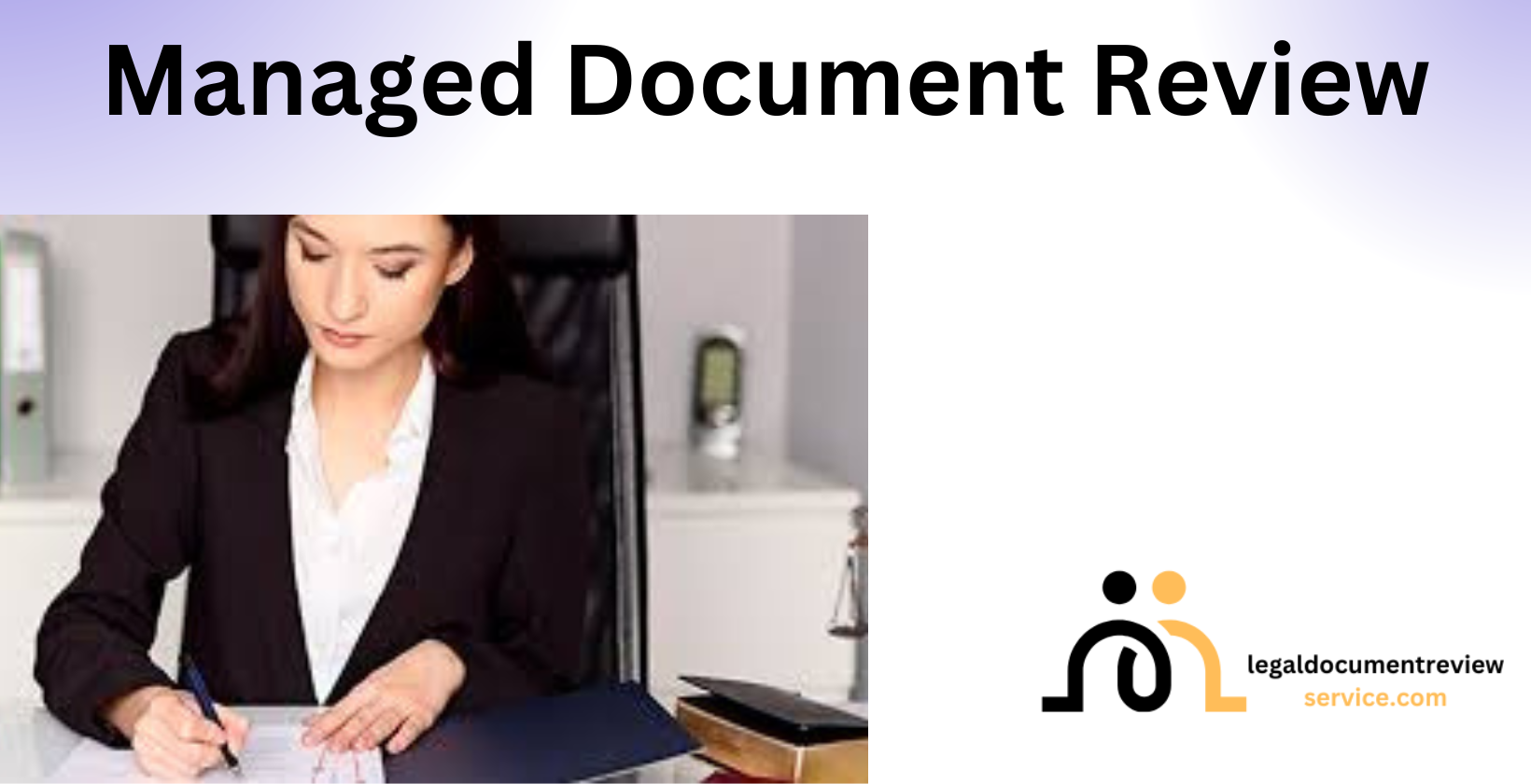Managed document review involves outsourcing the systematic examination of legal documents to third-party providers using advanced technology and streamlined processes. This service ensures cost-effective, accurate, and scalable handling of large document volumes in legal cases. Extractively, it centralizes document analysis for litigation, mergers and acquisitions (M&A), and compliance, leveraging tools like AI and predictive coding. Abstractively, managed document review transforms complex legal workflows into efficient, tech-driven solutions, reducing time and errors while meeting strict deadlines.
What Are Managed Document Review Services?
Managed document review services are outsourced processes where legal documents are systematically analyzed by third-party providers, often using legal technology to enhance efficiency. The “managed” aspect emphasizes centralized coordination, streamlined workflows, and expert oversight, distinguishing it from in-house reviews. These services address business needs by reducing costs, improving accuracy, and scaling to handle large document sets, such as those in litigation or M&A due diligence. According to a 2023 study by Georgetown University Law Center, firms using managed review services saved 30-50% on document review costs compared to traditional methods. In the context of eDiscovery and legal process outsourcing, these services support compliance and litigation by integrating tools like Relativity, ensuring precise privilege and relevance tagging.
What Is the Managed Document Review Process?
The managed document review process begins with data collection, where electronic documents are gathered from sources like emails and databases. Processing follows, converting data into reviewable formats using tools like Relativity. Reviewers are trained on case-specific guidelines, ensuring consistency in identifying relevant or privileged documents. Workflows incorporate AI-assisted review and predictive coding to prioritize key documents, reducing manual effort. Quality control checks verify accuracy, while final outputs, such as privilege logs, are delivered to clients. A 2022 report from Stanford Law School noted that AI-driven reviews increased accuracy by 25% in complex litigation cases. This structured approach fulfills user intent for understanding “how it works,” providing a clear, tech-enhanced roadmap for legal document management.
What Is Managed Review in Legal Practice?
Managed review in legal practice involves outsourcing document review to specialized providers, enabling law firms, corporate legal departments, and legal service providers to support litigation, regulatory responses, and due diligence. Attorneys define legal strategy, project managers streamline workflows, and contract reviewers analyze documents, integrating seamlessly with in-house or outside counsel plans. A 2024 American Bar Association case study reported a 40% reduction in review time for a law firm in multi-district litigation, showcasing efficiency. This approach optimizes resources and scalability, addressing the needs of legal operations professionals and decision-makers focused on effective practice management.
How Do Managed Document Services Support Litigation?
Managed document services enhance litigation by ensuring accurate document relevance, privilege screening, and adherence to discovery timelines while managing costs. These services are critical in pre-trial discovery, handling large document volumes, and trial preparation, prioritizing evidence. A 2023 Law360 article highlighted a 35% cost reduction in an antitrust case using managed review. “Managed review was a game-changer for meeting court deadlines,” noted a litigation attorney in a 2024 ABA Journal feature. In In re Actos Litigation (2015), streamlined review accelerated discovery, ensuring compliance and minimizing risks, positively impacting case outcomes.
What Are Managed Documents in Legal Workflows?
Managed documents in legal workflows are systematically processed by internal or external providers through stages like case intake, review, collaboration, quality assurance, and archiving. Examples include contracts, compliance filings, and litigation records. Tools like iManage and NetDocuments facilitate document lifecycle management, ensuring accuracy and accessibility. A 2023 University of Chicago Law School study found 20% fewer errors with these platforms. Integration with case management software, such as Clio, enhances efficiency in contract management, compliance reviews, and litigation support, enabling automated workflows and collaboration for legal teams.
What Is Managed eDiscovery and How Does It Relate to Doc Review?
Managed eDiscovery is an outsourced service where experts manage data preservation, collection, processing, and hosting, aligning with the eDiscovery Reference Model (EDRM) stages: identification, preservation, collection, processing, review, analysis, production, and presentation. Document review occurs post-processing, before production, focusing on identifying relevant, privileged, or responsive documents using AI tools like Relativity, Logikcull, and Everlaw. Managed review enhances eDiscovery by refining outputs for legal compliance, with trained reviewers ensuring accuracy. A 2024 Harvard Law Review article noted 30% faster processing in United States v. Microsoft Corp. (2018) due to integrated eDiscovery and review tools, reflecting the critical role of tech-driven solutions in modern legal workflows.
What Is Document Review in Law?
Document review in law involves analyzing documents for relevance, privilege, confidentiality, and responsiveness in litigation, investigations, regulatory responses, and due diligence. Attorneys or contract reviewers assess documents, guided by legal ethics requiring accurate privilege logs and confidentiality protection, as mandated by Federal Rules of Civil Procedure Rule 26. Manual review relies on human judgment, while technology-assisted review (TAR) uses AI to prioritize documents, improving efficiency. In class actions like In re Volkswagen “Clean Diesel” Litigation (2016), TAR reduced review time by 25%, per a 2023 Stanford study. Document review is critical in mergers for due diligence and in criminal defense for evidence analysis, ensuring compliance and strategic case preparation.
What Are Legal Document Review Services and Who Needs Them?
Legal document review services are outsourced or in-house solutions that manage bulk review tasks for legal cases. Law firms, corporate legal departments, government agencies, and compliance teams rely on these services to handle large document volumes, reduce costs, save time, and leverage expertise in domains like antitrust, intellectual property, and securities. A 2024 Georgetown Law study reported 45% of Fortune 500 companies outsourced review to cut costs by 30%. Major firms use offshore teams or AI-based solutions, as seen in a 2023 Law360 case study on an IP dispute. Services differ by provider: freelance reviewers offer flexibility, staffing companies supply temporary teams, and full-service vendors like Epiq provide end-to-end solutions, catering to diverse legal needs.
Where Can I Access Legal Document Review Online?
Trusted platforms for online legal document review include LegalDocumentReviewServices.com. Remote environments are secured through NDAs, end-to-end encryption, and virtual data rooms (VDRs) like iDeals, which support GDPR and SOC 2 standards. Businesses can request services via provider websites, submitting case details for customized quotes. Turnaround varies by project size, typically 1-4 weeks, with pricing starting at $30/hour for basic reviews. Choose providers with audited compliance (e.g., SOC 2, HIPAA), transparent pricing, and industry expertise. Ensure GDPR and HIPAA compliance for international data sharing, using providers with data protection agreements to safeguard privacy.
What Is Documentation Review and How Does It Helps Law Firms?
Documentation review in law involves analyzing contracts, filings, disclosures, and case materials for accuracy, completeness, and legal compliance. Law firms use it for risk assessment, strategy formulation, fact pattern identification, and discovery preparation. For example, in M&A, firms review contracts to identify liabilities, while in litigation, they assess evidence for relevance, as seen in In re Vioxx Litigation (2007). A 2023 American Bar Association report noted that thorough review reduces malpractice risk by 15% and enhances billable accuracy through precise time tracking. By ensuring compliance in regulatory audits, such as SEC filings, documentation review strengthens case strategy, minimizes errors, and supports informed decision-making, per a 2024 Yale Law Journal article on practice management.
What Are Document Review Projects in Legal Cases?
Document review projects are large-scale, time-bound assignments tailored to specific legal cases or compliance investigations, involving teams analyzing thousands of documents. These projects use platforms like Relativity or Everlaw to identify “hot docs” or privileged items, often in antitrust probes or SEC investigations. For instance, Epiq managed a 2023 antitrust case, reviewing 2 million documents for relevance. The project lifecycle includes kick-off, reviewer onboarding, quality control, and final production. In SEC v. Tesla, Inc. (2018), document review uncovered critical communications, shaping case outcomes. Lighthouse emphasizes that structured workflows and AI tools reduce review time by 30%, ensuring efficiency and accuracy in high-stakes cases, per their 2024 whitepaper.
Which Document Review Companies Offer the Best Legal Support?
LegalDocumentReviewServices.com provides document review services for law firms and corporate legal departments, supporting areas such as litigation, antitrust, mergers and acquisitions, and regulatory compliance. The service employs platforms like Relativity and Everlaw, integrating AI-driven analytics to facilitate efficient review processes across industries, including healthcare, finance, and government. With operations adhering to GDPR and SOC 2 compliance standards, LegalDocumentReviewServices.com conducts secure reviews globally. Its proprietary AI tools assist in managing complex cases, such as those involving cybersecurity and intellectual property, and the service is noted for its expertise in antitrust and compliance matters, offering tailored solutions to address client-specific requirements.
What Is a Document Review Tool and How Is It Used in Law?
A document review tool is a software application designed to examine, tag, categorize, and assess large volumes of legal documents for relevance, privilege, or responsiveness. Legal teams use tools like Relativity, Everlaw, Logikcull, and DISCO in eDiscovery, contract management, compliance audits, and regulatory matters. Basic features include keyword search and metadata filtering, while advanced capabilities like predictive coding, privilege tagging, and redaction streamline workflows. Relativity offers robust analytics for litigation, used in 76% of AM Law 100 firms. Everlaw’s AI Coding Suggestions cut review time by 66%, per a 2025 X post. Logikcull simplifies cloud-based discovery for small firms, and DISCO automates data processing for corporate counsel. These tools ensure compliance with Federal Rules of Civil Procedure, reducing errors in privilege logs and supporting cases like SEC v. Ripple Labs (2023).
How Does a Document Review Platform Streamline Legal Operations?
A document review platform, unlike a single-feature tool, provides an end-to-end solution with collaborative workflows, reviewer management, QA checks, and cloud storage. Platforms like RelativityOne and Everlaw integrate with case management systems like Clio, enabling real-time tracking and remote access for distributed teams. They reduce turnaround time by automating document prioritization, with a 2024 Consilio case study showing a 50% reduction in review hours for an Am Law 100 firm using Aurora. Accuracy improves through AI-driven relevance tagging, minimizing compliance risks, as seen in a 2023 Lighthouse benchmark reporting 20% fewer errors in SEC audits. Platforms support secure collaboration, ensuring GDPR and HIPAA compliance, and streamline discovery in cases like United States v. Microsoft Corp. (2018). By centralizing workflows, they enhance efficiency and strategic focus for law firms and corporate legal teams.
What Is Software Document Review and Why Does It Matter?
Software document review uses advanced legal technology, including AI, technology-assisted review (TAR), and machine learning, to analyze case-related documents efficiently. It enhances large-scale litigation, cross-border investigations, and regulatory reviews by automating document categorization and relevance detection. Attorney productivity increases as TAR prioritizes critical documents, reducing review time by 40%, per a 2024 Georgetown Law study. Cost savings are significant, with firms reporting 30-50% lower discovery costs, according to a 2023 Stanford Law report. Compliance with discovery obligations improves through accurate privilege detection and responsive analysis, ensuring adherence to Federal Rules of Civil Procedure. Audit trails provide defensibility in court, as seen in In re Actos Litigation (2015), where software review streamlined evidence production, minimizing disputes.
Which Legal Document Review Software Is Best for Complex Cases?
RelativityOne, Everlaw, DISCO, Logikcull, Reveal, Axcelerate, and Nextpoint are top platforms for complex, high-volume, or multi-jurisdictional litigation, each offering unique strengths. RelativityOne excels in scalability and AI classification, supporting multi-language reviews with SOC 2 and GDPR compliance, favored by 80% of AM Law 100 firms, per a 2024 Gartner report. Everlaw’s collaboration tools and predictive coding cut review time by 66%, ideal for large law firms, earning a 2025 LegalTech News award. DISCO automates data processing with robust security, suited for in-house legal departments handling cross-border cases. Logikcull’s cloud-based simplicity benefits boutique litigators, with G2 ratings of 4.7/5 for usability. Reveal’s Brainspace offers advanced analytics for investigations, while Axcelerate’s multi-language support serves global cases. Nextpoint’s affordability and ease of use cater to smaller firms, with strong collaboration features. For complex cases, RelativityOne and Everlaw lead for large firms, Logikcull and Nextpoint suit boutiques, and DISCO fits in-house teams, per 2024 G2 reviews.
Meet the Author
Annette E. – Experienced Lawyer at LegalDocumentReviewService
Annette E. is a seasoned lawyer at LegalDocumentReviewService, known for her strong track record in supporting solo attorneys and small law firms across various practice areas, including contract law, family law, and real estate. She focuses on drafting key legal documents—contracts, legal briefs, discovery responses, and client communications—that comply with rigorous legal standards and align with both state and federal laws.
Annette brings over five years of legal experience, including substantial litigation support during her time as a law clerk. Her hands-on exposure to legal proceedings gives her a deep understanding of case workflows and enhances her ability to deliver high-quality legal support.
Holding a Juris Doctor (J.D.) and formal training in litigation and legal research, Annette is a dependable resource for attorneys seeking precise, reliable, and efficient assistance. Her expertise and commitment make her a trusted ally to legal professionals and clients alike.



